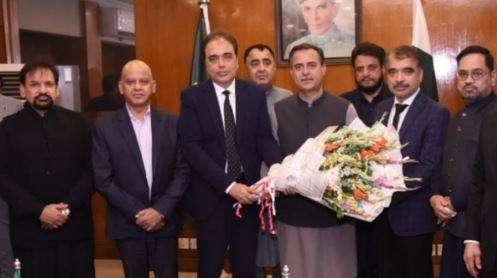KARACHI: Federal Minister for Maritime Affairs, Junaid Anwar Chaudhry, has announced that the government has agreed in principle to establish Pakistan’s own shipping line, fulfilling a long-standing demand of the country’s business community. The announcement came during the minister’s visit to the Federation of Pakistan Chambers of Commerce & Industry (FPCCI) Head Office in Karachi, where he held an extensive consultative session with leading figures from the business, trade, and shipping sectors.
Mr. Atif Ikram Sheikh, President of FPCCI, informed the media that the federal minister had endorsed the federation’s proposal, emphasizing that Pakistan pays a staggering PKR 728 billion annually to foreign shipping lines—an expense that significantly drains the country’s foreign exchange reserves. Establishing a national shipping line, the minister agreed, was essential for securing Pakistan’s economic interests and reducing its dependency on international carriers.
During his address, Minister Junaid Anwar Chaudhry also shared that the government intends to acquire new vessels to expand the national fleet, thereby strengthening Pakistan’s maritime presence. He assured the business community that his ministry would maintain an open-door policy to immediately address their concerns and streamline maritime operations in the interest of the economy.
The minister also revealed that the Karachi Port Trust (KPT) had successfully reclaimed land worth PKR 100 billion from encroachers. He encouraged the business community to explore investment opportunities through joint ventures with KPT to develop commercial facilities on these lands.
FPCCI President Atif Ikram Sheikh welcomed the minister’s support and pledged full cooperation in the consultative process to ensure the new shipping line is built around practical business needs. He emphasized the importance of involving FPCCI representatives from the beginning to keep the initiative aligned with ground realities.
Senior Vice President of FPCCI, Saquib Fayyaz Magoon, raised the issue of the 1.8 percent infrastructure cess collected by the Sindh Government from importers, stating that the collected amount—around PKR 300 billion—should be transparently utilized for developing infrastructure around ports, industrial zones, and the city of Karachi at large. He added that these funds, if spent wisely, could transform the province’s infrastructure and align it with international standards.
He also highlighted the vulnerability of relying solely on the Native Jetty Interchange as the main access route to Karachi Port. In case of an emergency or disruption, he warned, the country’s trade operations could come to a complete halt. He urged the federal government to support the construction of an alternative route to prevent such a crisis.
FPCCI Vice Presidents Asif Sakhi and Aman Paracha called for greater coordination among the Karachi Port Trust, State Bank of Pakistan, Customs, and other relevant departments to eliminate procedural bottlenecks and support seamless trade. They stressed that exorbitant port and terminal charges must be rationalized to relieve pressure on traders and make Pakistan’s maritime sector regionally competitive.
Responding to these concerns, Minister Junaid Anwar Chaudhry assured the participants that he was willing to take up key issues—such as infrastructure development and cess utilization—with the Sindh Government, and would do so in partnership with the business community to protect national economic interests.







